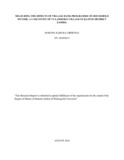Mulungushi University Repository
Measuring the effects of village bank programme on household income. a case study of Vulamkoko village in Katete district Zambia.
- MU Home
- →
- Directorate of Research and Post-Graduate Studies
- →
- Disaster Studies
- →
- View Item
JavaScript is disabled for your browser. Some features of this site may not work without it.
| dc.contributor.author | Chisenga, Martha Kabuka | |
| dc.date.accessioned | 2019-04-11T10:30:32Z | |
| dc.date.available | 2019-04-11T10:30:32Z | |
| dc.date.issued | 2018-08 | |
| dc.identifier.uri | https://space.mu.ac.zm/xmlui/handle/123456789/138 | |
| dc.description.abstract | The study was conducted to analyze the effects of village bank programme on household income in Vulamkoko village in Katete district Zambia. A cross sectional study design was used and a purposive sampling technique was used to obtain the data. Data were obtained using the structured questionnaire, two focused group discussions in Kadula and Chimutende and some indepth interviews with key informants .The sample size was 100 households and 50 constituted the non-village banking members, which was the control group, the other 50 was village banking members. This paper found that household credit has a significant and positive relationship with household per capita expenditure and per capita nonfood expenditure. Moreover, household credit has a greater influence on poor households, in comparison with better-off households. The relationship between household borrowing and per capita food expenditure, however, turns negatively. These findings confirm that providing microfinance to the poor is an effective policy tool to reduce household poverty. Yet, its modest marginal impact suggests that poverty alleviation programmes need to refocus their attention on enhancing the efficiency and diversification of microfinance activities. The village bank group (N = 50) was associated with an average monthly Income (Mean = K1144.03, SD 958.3117), by comparison non village bank group was (N = 50) with monthly Income (Mean= K530.72, SD 616.23). To test the hypothesis that Village bank group and nonvillage bank group have significant different mean income, an independent samples test was performed. As can be seen in the table 3. Additionally, the assumption of homogeneity of variance was tested via Levenes F test, F (98) =1.465, p = 0.230, p >0.05. | en_US |
| dc.language.iso | en | en_US |
| dc.publisher | Mulungushi University | en_US |
| dc.subject | Effects, Village bank, household and Income | en_US |
| dc.title | Measuring the effects of village bank programme on household income. a case study of Vulamkoko village in Katete district Zambia. | en_US |
| dc.type | Thesis | en_US |
